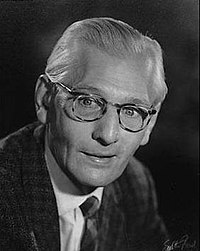Christopher Hawkes
Christopher Hawkes | |
|---|---|
 | |
| Born | Charles Francis Christopher Hawkes 5 June 1905 |
| Died | 29 March 1992 (aged 86) |
| Occupation | Archaeologist |
Charles Francis Christopher Hawkes, FBA, FSA (5 June 1905 – 29 March 1992) was an English archaeologist specialising in European prehistory. He was Professor of European Archaeology at the University of Oxford from 1946 to 1972.
He was educated at Winchester College and New College, Oxford, where he obtained first class honours in classics. He began archaeological work at the British Museum and was then appointed Professor of European Archaeology at Oxford in 1946. He was a Fellow of Keble College. He was awarded the Gold Medal of the Society of Antiquaries in 1981.[1]
In 1933 he was married to Jacquetta Hopkins, but they were divorced in 1953. With Jacquetta Hawkes, he co-authored Prehistoric Britain (1937). He married Sonia Chadwick, also an archaeologist, in 1959.[2] They jointly edited Greeks, Celts and Romans: studies in venture and resistance, 1973.
He was survived by his wife Sonia and son Nicholas.
Biography
Early life: 1905–
Hawkes' paternal family had been ironmasters in Birmingham, operating The Eagle Iron Foundry. His paternal grandfather Charles Samuel Hawkes moved to Beckenham in Kent with his seven children following the death of his wife; he later moved to South America, where he took a second wife.[3] Hawkes' father was raised in Kent, before studying History at Trinity College, Cambridge from 1894 to 1897. He travelled to the Canary Islands, where he met a woman who was half-Spanish and half-English, and they subsequently married, resulting in Hawkes' birth.[4] Being schooled in London, Hawkes inherited his father's fascination with past societies, influenced in this by the scenery of southern England and what he had read in the works of Rudyard Kipling.[5] When the First World War broke out in August 1914, Hawkes' father volunteered to join several friends in the Special Reserve of the Northumberland Fusiliers; he brought his family to Northumberland with him, where Christopher encountered archaeological and historical monuments in the North-East, such as Hadrian's Wall and Durham Cathedral.[6]
References
- ^ Harding (1992)
- ^ Collectanea antiqua: essays in memory of Sonia Chadwick Hawkes was published in 2007
- ^ Hawkes 1989, p. 46
- ^ Hawkes 1989, pp. 46–47
- ^ Hawkes 1989, p. 47
- ^ Hawkes 1989, p. 47
Further reading
- Daniel, Glyn Edmund; Chippindale, Christopher (1989) The Pastmasters: Eleven Modern Pioneers of Archaeology: V. Gordon Childe, Stuart Piggott, Charles Phillips, Christopher Hawkes, Seton Lloyd, Robert J. Braidwood, Gordon R. Willey, C. J. Becker, Sigfried J. De Laet, J. Desmond Clark, D.J. Mulvaney. New York: Thames and Hudson (hardcover, ISBN 0-500-05051-1).
- Harding, D. W. "Christopher Hawkes", in: The Record; 1992. Keble College; pp. 48–51
- Webster, Diana Bonakis (1991) "Hawkeseye": the early life of Christopher Hawkes. Stroud: Alan Sutton (hardcover, ISBN 0-86299-881-6
- Díaz-Andreu, Margarita, Megan Price and Chris Gosden 2009. "Christopher Hawkes, his archive and networks in British and European archaeology". The Antiquaries Journal 89: 1-22 Christopher Hawkes: his archive and networks in British and European archaeology; by Margarita Díaz-Andreu, & Megan Price
